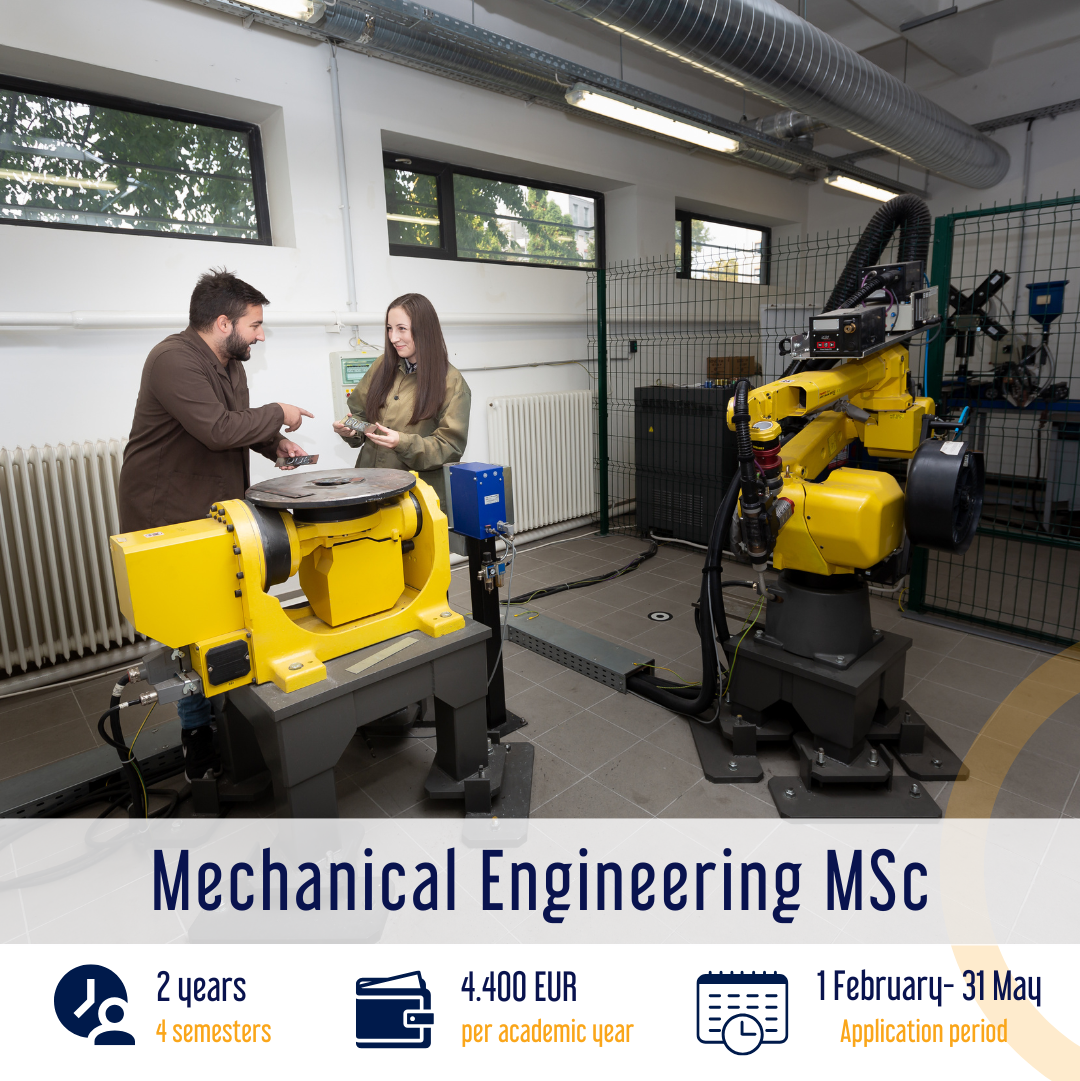|
Level of qualification: |
|
|
Master (MSc) |
|
|
Degree: |
|
|
Master’s (MSc) Specification of degree to be obtained: Mechanical Engineer |
|
|
Scheme of study: |
|
|
4 semesters full-time program |
Upon entering this MSc course, the courses/degrees accepted as preceding studies are the following:
a) With full credit value can be taken into account: the BSc course in Mechanical Engineering
b) To be admitted to the master’s programme, you must have obtained at least 40 credits (including at least 12 credits in mathematics, at least 5 credits in physics and at least 20 credits in professional studies) out of the 70 credits listed below:
- 20 credits in basic sciences (mathematics, physics, mechanics, materials science, thermodynamics);
- 10 credits in economic and human sciences (economics, management, environment, quality assurance, occupational health and safety, social sciences)
- 40 credits in the field of professional knowledge (general engineering, machine and product design, structural engineering, materials science and technology, information technology, measurement and signal processing, control engineering, safety engineering, energy technology, machinery and processes, production technology, production automation, quality assurance, logistics, vehicles and mobile machinery, chemical and environmental processes, electrical engineering and electrical engineering).
In the master’s programme, the missing credits in the listed areas must be acquired in accordance with the study and examination regulations of the higher education institution.
c) To the input b) The input can be primarily counted by completing the credits specified in b): from the engineering field of study, materials engineering, safety engineering, military and security engineering, light industrial engineering, civil engineering, engineering geology, engineering management, chemical engineering, environmental engineering, energy engineering, industrial product and design engineering, transport engineering, automotive engineering, mechatronics engineering, electrical engineering, and agricultural engineering in the field of agricultural engineering.
Specialization:
- Lifetime Management
- Modern Material Structure and Technology
Credit units required for MSc degree: 120.
- 1. Credit units assigned to basic knowledge: 30 to 56.
2. Credit units assigned to professional core material: 10 to 30.
3. Credit units assigned to specialized course knowledge, including thesis: 46 to 60.
4. Minimum credit units assigned to optional subjects: 6.
5. Credit unit value assigned to thesis: 30.
6. Practical knowledge proportion: minimum 30 percent according to the curriculum.
Objectives of the MSc course, the competences to be acquired:
The education is aimed at training engineers capable of elaborating the concept of machines, mechanical equipment and processes, modelling them, then planning, operating and maintaining them; developing machine industry technologies, new materials, production technologies and using them in view of environmental aspects; performing leading, management and organization tasks, performing the tasks of technical development, research, planning and innovation, connecting to and coordinating engineering projects of domestic and/or international level, as well as continuing engineering studies even within the scope of doctor’s education.
a) Graduates at MSc level are familiar with:
- theory and practice in the mechanical engineering profession, possess the necessary manual skills, measuring abilities with laboratory-level knowledge,
- management tasks and activities,
- IT communication and analysis,
- basic regulations of environment protection, quality management, consumer protection, product liability, principles and application of chances of equality access, workplace health and safety, technical and economical legal regulations as well as the fundamental provisions of engineers’ ethics,
- problem solution techniques necessary for research or scientific work suitable to be used widely,
- the global social- and economic processes.
b) Graduates of the master’s degree course are capable of:
- applying the knowledge acquired and utilizing it in practice, using the problem solution techniques,
- processing the information on the limits of the professional experience acquired in the discipline as well as from arising new problems and new phenomena,
- formulating relevant judgment or opinion according to possibilities, making decisions and drawing conclusions,
- understanding the problems to be solved and finding solutions to them, raising original ideas,
- planning and implementing tasks at a high professional standard in a self-dependent way,
- improving their knowledge to a higher level by means of self-education and self-development,
- viewing the management of technical, economic and human resources in a complex way,
- global planning of complex systems based on systems thinking and process oriented mentality,
- applying integrated knowledge on the professional fields of machines, mechanical equipment and processes, machine industry materials and technologies as well as the connected fields of electronics and information technology,
- applying procedures, models, information technologies used in planning, organization and operation of mechanical systems,
- assuring the quality of mechanical systems and technologies, solving tasks of measuring techniques and signal processing,
- analyzing, planning, developing, manufacturing and operating the machines and mechanical equipment in the procedures and processes of material sciences, mechanics, production technology, planning, manufacturing, production control, instrument technology, fluid mechanics and thermodynamics depending on the selected specialization.
c) Personal abilities and competences necessary for pursuing the qualification are:
- creativity, flexibility,
- problem recognizing and solving skills,
- intuition and methods usage,
- ability to learn and good memory,
- a wide range of general education,
- information processing capability,
- sensitivity to environmental problems,
- commitment to and need for high-quality work,
- positive attitude to professional extension training,
- initiation, personal responsibility and practice, decision making,
- suitability for cooperation, participation in team work, performing management tasks following appropriate practice.
Determining knowledge fields (subjects) in accordance with this Master’s degree and qualifications
1. Ground subjects (extending BSc qualification to MSc level)
Natural science basics: 20 to 36 credit units
Mathematics, physics, mechanics, material science, thermo- and hydrodynamics and other subjects by institution;
Economics and human skills: 10 to 20 credit units,
Management and executive skills, quality assurance, environment protection, recycling, energy management, communications, marketing, legal and financial skills, other subjects specified by the institution.
2. Professional core material: 10 to 30 credit units,
Machine construction, design and production, measure and signal processing, electronics, independent project work, further core material specified by the institution.
3. Mandatory optional subjects from the professional core material: 46 to 60 credit units.
Differentiated professional skills:
All those special professional skills, which are prerequisites for a successful pursuit and development on the following fields:
applied mechanics, material science, fluid dynamics, building engineering, mechanical procedure techniques, informatics of mechanical systems, machine production technology, machine design, thermodynamic power machines and equipment, agricultural machines, instrument technology and quality assurance, and polymer technology.
Thesis: 30 credit units.
Professional Internship - requirements
Duration is at least four weeks, determined by the curriculum of the higher education institution.
Based on considering the attainments that serve as a basis of determining the credit — as specified in the Act on higher education — at least 80 credits according to former studies shall be able to be recognized in the fields as follows:
- basic attainments in the field of natural science (30 credits): mathematics, physics, chemistry, mechanics, material science, thermodynamics and fluid mechanics;
- economic and human knowledge (10 credits): economics, company economics, environmental protection, quality assurance, labour safety, social science;
- professional knowledge (40 credits): general mechanics, electrotechnics, fundamentals of machine design, fundamentals of CAD/CAM, machine elements, fundamentals of mechanical engineering, metallography, material science and technology of of polymers, machine production technology, IT systems, program planning, measurement and signal processing, hydraulic and thermal machines, control engineering, material transport machines and systems, safety engineering, chemical engineering and energetics, quality assurance, mobile machines, agricultural machines, planning of machines and products, environmental industry.
A condition of admission to master’s course shall be that the student acquired at least 50 credits in the fields of knowledge listed above. The missing credits shall be acquired in parallel with the master’s course within two semesters following the admission as specified in the study and examination regulations of the higher educational institution.
Curriculum for Mechanial Engineering MSc program
Full description of the Mechanial Engineering Msc program from 2023
full description of the Mechanical Engineering Msc program from 2024
Full description of the Mechanial Engineering Msc program from 2025
Are you considering applying for this programme?
- Check out some information about the APPLICATION AND ADMISSION PROCESS!
- More info about ACCOMODATION and COST OF LIVING are also available on our website.
- You can also check some STUDENT TESTIMONIALS or even read ALUMNI INTERVIEWS to have a broader picture about studying at the University of Dunaújváros.
- Should you still have any question, feel free to This email address is being protected from spambots. You need JavaScript enabled to view it.!




